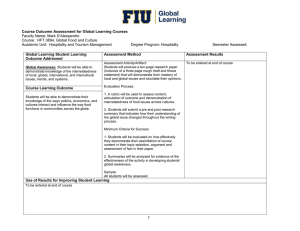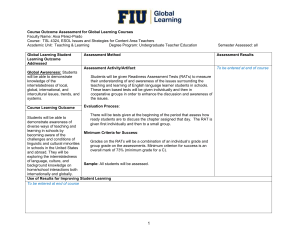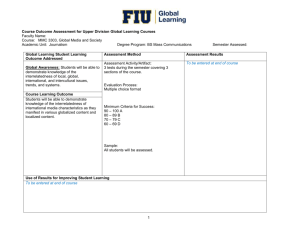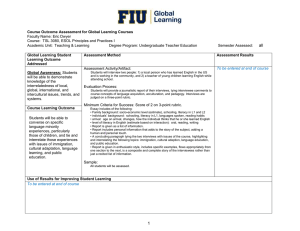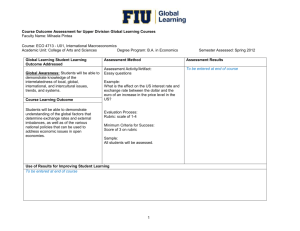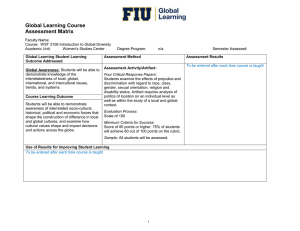Expanded Statement of Institutional Purpose
advertisement
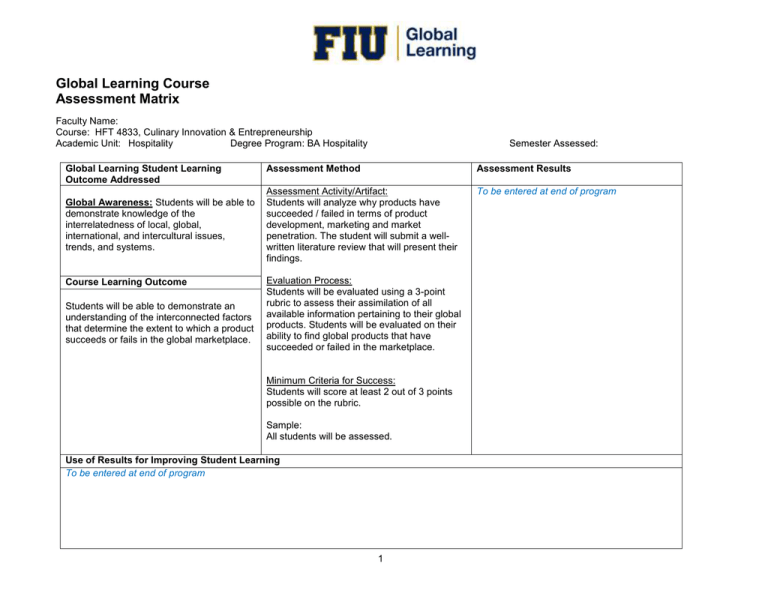
Global Learning Course Assessment Matrix Faculty Name: Course: HFT 4833, Culinary Innovation & Entrepreneurship Academic Unit: Hospitality Degree Program: BA Hospitality Global Learning Student Learning Outcome Addressed Global Awareness: Students will be able to demonstrate knowledge of the interrelatedness of local, global, international, and intercultural issues, trends, and systems. Course Learning Outcome Students will be able to demonstrate an understanding of the interconnected factors that determine the extent to which a product succeeds or fails in the global marketplace. Semester Assessed: Assessment Method Assessment Results Assessment Activity/Artifact: Students will analyze why products have succeeded / failed in terms of product development, marketing and market penetration. The student will submit a wellwritten literature review that will present their findings. To be entered at end of program Evaluation Process: Students will be evaluated using a 3-point rubric to assess their assimilation of all available information pertaining to their global products. Students will be evaluated on their ability to find global products that have succeeded or failed in the marketplace. Minimum Criteria for Success: Students will score at least 2 out of 3 points possible on the rubric. Sample: All students will be assessed. Use of Results for Improving Student Learning To be entered at end of program 1 Global Learning Course Assessment Matrix Faculty Name: Course: HFT 4833, Culinary Innovation & Entrepreneurship Academic Unit: Hospitality Degree Program: BA Hospitality Global Learning Student Learning Outcome Addressed Global Perspective: Students will be able to conduct a multi-perspective analysis of local, global, international, and intercultural problems Course Learning Outcome Students will use multiple perspectives in researching and evaluating the success or failure of their chosen products in the global market place. Semester Assessed: Assessment Method Assessment Results Assessment Activity/Artifact: Students will choose two different global food products (one-domestic product and one global product); one of which has succeeded and one that has failed. They will write a onepage summary on each product and explain the reasons for its success or failure in the global market place. The student will submit a well-written literature review that presents their findings. To be entered at end of program Evaluation Process: Students will be evaluated using a 3-point rubric to assess their assimilation of all available information pertaining to their global products. Minimum Criteria for Success: Students will select two products that are/were sold in the global marketplace. Sample: All students will be assessed. Use of Results for Improving Student Learning To be entered at end of program 2 Global Learning Course Assessment Matrix Faculty Name: Course: HFT 4833, Culinary Innovation & Entrepreneurship Academic Unit: Hospitality Degree Program: BA Hospitality Global Learning Student Learning Outcome Addressed Global Engagement: Students will be able to demonstrate willingness to engage in local, global, international, and intercultural problem solving. Course Learning Outcome Students will be able to demonstrate leadership in task and action planning when developing and implementing a new product suitable for the global marketplace. Semester Assessed: Assessment Method Assessment Results Assessment Activity/Artifact: In groups, students will choose a product found in a local grocery store and creatively will come up with an entirely new product using that product as the base, this product will be sold in the global market place. The group will perform a 10minute class presentation of their new product. Where they will cover: product name, product definition, global history of the item, production, quality characteristics, brands or grades, storage/shelf life, uses, gross purchasing specifications, and typical cost. To be entered at end of program Evaluation Process: The final project will be graded using a 5-point rubric to assess their comprehension of the reading, problem solving ability, and creativity in developing ideas that will influence societal change. The students will be evaluated based on their business idea that includes and description of the idea; the uniqueness of the concept, potential markets served, competition/comparable goods, and strength and challenges analysis. The final project should be no less than four pages. Minimum Criteria for Success: Students will demonstrate with applicable data that their product will be viable in a global marketplace and establish a plan for marketing, market penetration and product placement. Sample: All students will be assessed. Use of Results for Improving Student Learning To be entered at end of program 3
